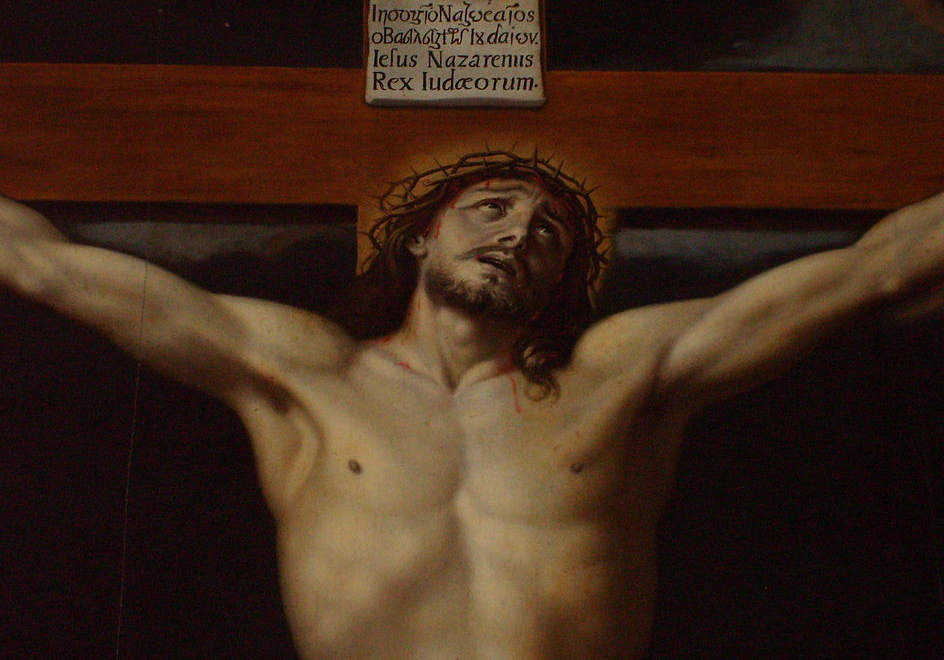
Detail of “La Crucifixion” by Phillippe de Champaigne (1602-1674), oil on canvas, painted 1644-1646. WIKIMEDIA COMMONS/PUBLIC DOMAIN
Spiritual Life
The power of sacrifice
March 17, 2022
More times than I can count I get asked a question like this: “Father, my children have left the Church. I pray for them all the time. What more can I do?”
Certainly, prayer is very good. It nourishes our relationship with God and conforms our will to His. In prayer we bring our needs before the Lord, and we entrust ourselves and others to His loving care. Prayer is like oxygen for the soul. Without it we die.
However, when it comes to saving the world – and individual souls in the world – sacrifice is necessary. Indeed, there is one sacrifice that saves us from our sins and restores our relationship with God: the Sacrifice of Jesus upon the Cross. So important is this saving mystery that Jesus left us the Eucharist as the memorial of His Passion and Death. Now, every time the Church celebrates the Sacrifice of the Mass, we enter into and participate in this singular moment of our salvation.
Participation in the mystery is key. Jesus did not desire us to be passive spectators in our redemption. Rather, He chose to unite us to Himself by a bond that can never be broken. In Pentecost, Jesus gave us the Gift of the Holy Spirit to unite us more perfectly with God and each other. By the Spirit’s power, we become members of the Body of Christ, and we have been sent out on mission to extend the saving power of the Gospel to the whole world.
In his preaching of the Gospel, St. Paul told of this powerful connection to Christ: “Now I rejoice in my sufferings for your sake, and in my flesh I am filling up what is lacking in the afflictions of Christ on behalf of his body, which is the church” (Colossians 1:24). Paul acknowledged that, as a member of Christ’s Body, he himself had an active role to play in Jesus’ Sacrifice upon the Cross.
The Head alone did not suffer upon the Cross; the entire Body of Christ has been called to the Cross: “Whoever wishes to come after me must deny himself, take up his cross, and follow me” (Matthew 16:24). Each of us, then, must participate in offering to the Father the Sacrifice of Jesus the Son.
This, of course, is done in a wondrous way at Holy Mass by the priest. Just as he offers the sacrifice for the whole world so too does he offer the Mass for a particular intention. In other words, as he participates in the salvation of the whole world with Christ on the Cross, he, as a single member of the Body, directs that salvation to a specific member of the world being saved by Christ.
Moreover, each of the faithful, in virtue of one’s baptismal priesthood, is called also to offer the sacrifice of the Cross in his or her own life. Whenever we unite our sufferings, afflictions and trials with the suffering of Jesus upon the Cross, we become participants in the mystery of salvation. Like the priest at Mass, we have the power to direct the gift of salvation to a particular member – living or deceased – who is in need of that salvation.
Lent offers us a time to be renewed in discipleship and to prepare ourselves to participate more worthily in the Paschal Mystery of Christ. Many of us take up Lenten penances to help us draw nearer to Christ’s Cross. As we offer them, we should be conscious of how they unite us to Christ on the Cross and how, through them, we can participate in saving a soul.
Even after Lent has come to its joyous conclusion at Easter, we should continue to offer ourselves with Jesus on the Cross for the salvation of one another. This, indeed, is my counsel to those who ask what more than prayer they can do for someone. Through penance and sacrifice, we join ourselves to Christ on the Cross and direct that very power to those in need.
Father Jeff Loseke is pastor of St. Charles Borromeo Parish in Gretna.